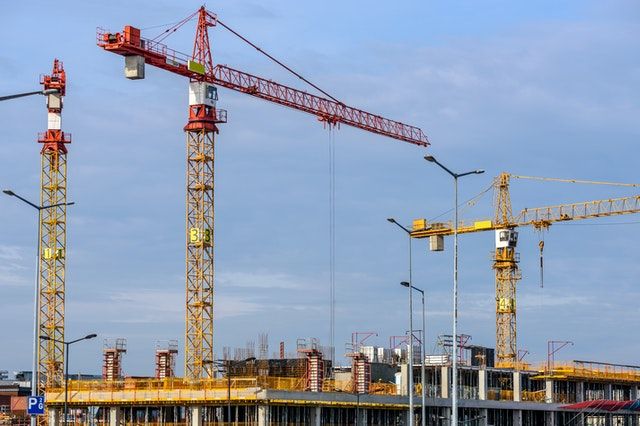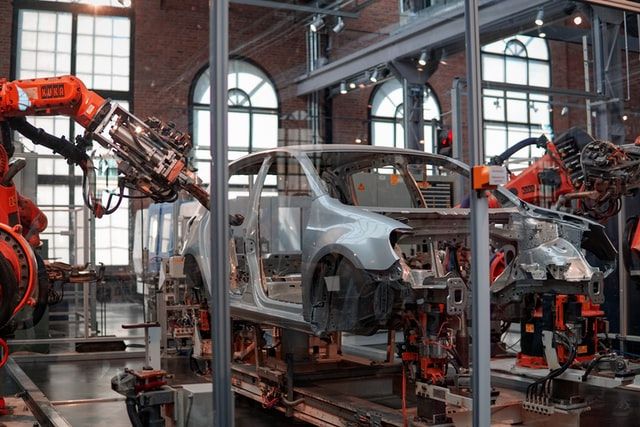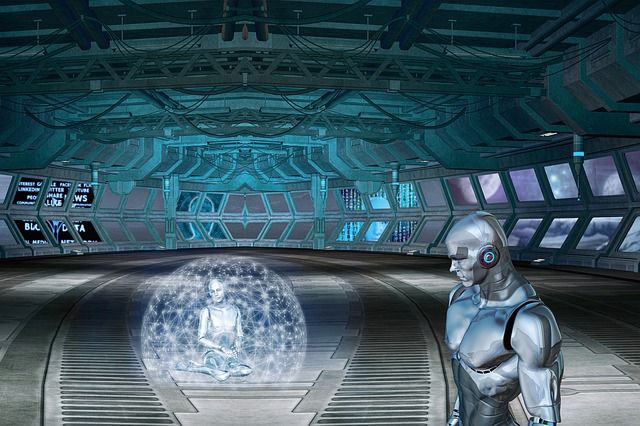Artificial Intelligence in the Construction Industry
Artificial intelligence has shown to be a fantastic tool in the building industry. To save time and money, AI assists in the creation of incredibly beautiful houses, offices, towns, and, ultimately, communities around the world.

It is reported that on construction-based activities, individuals and businesses pay over $10 trillion per year globally, and it is expected to grow by 4.2% by 2023. In the 2020 report, McKinsey identified great work on applied construction solutions introducing AI in home construction and designing. AI has influenced almost every industry worldwide, infiltrating phones and smart homes. According to Etzioni, a tool, calculator, helps humans do math quickly than their hands could do it. It is known that humans are brains while machines are the muscle that covert a thought in real. Globally, humans are working on AI in different aspects and developing unique ideas in the medical, finance, real estate, and construction fields.
AI comprises a simple set of rules known as algorithm based on if this, then that. Artificial intelligence is a massive term that is a visual application of mimicking human intellectual tasks such as pattern recognition, problem solving, and understanding ability. Machine learning uses statistical strategies that allow computers to learn from past experiences and data without direct programming. A machine behaves like an expert if treated with important data and information.
AI tools, similarly, perform complex and costly tasks more accurately than performed by humans. Artificial intelligence in the construction market is proved to be an incredible technology. AI helps create exceptionally beautiful houses, offices, cities, and ultimately communities for the world to save time and money. AI will replace architects and structural engineers with computer-generated incredible ideas in the near future.

1. How Smart is AI in Construction?
A drone hovers on a construction site, and after a while, the tablet lights up, showing the observations made by the drone. For instance, in Block A, a laborer is not wearing a helmet, a portion in section B is waterlogged due to the appearance of a dark patch in that area, and four of the diggers are underused. AI promise to deliver this information to the construction department. AI in construction is not providing this type of functionality, but many industries are trying their best to train AI algorithms to construct buildings more effectively.
AI in construction is an innovative technology that emerged in recent years. And still, the technology is new, and under adopting process, it is expected to approach $4.5 billion by 2026, according to one report.
In construction, an ML construction program asks several questions before constructing a building to track any risks earlier. The developed technology might transform the construction industry in the design planning and labor-intensive stages. It requires a month of work and preparation from a team of experts If AI is not involved. Further, this work demands time, and the imaginations made might be incorrect, leading to an error waste of time and money.
2. AI-Based General Contractor Business Models
Progress is already made in artificial intelligence commercial buildings, where companies prefer to use sensors for data collecting and IoT (internet of things) for studying and improving performance and resource consumption. A nervous system is created by installing or mounting small sensors on the ceiling. The obtained data is then interpreted after sending to the cloud by platforms like MindSphere, Siemens’, or Schneider Electric’s EcoStruxure, which helps engineers control costs and utility usage. Synthetic construction management software producing companies like PlanGrid and Procore improved the usage of machine learning in their processes. The technology helps prioritize tasks, maintain equipment, and reduce the risk of injuries. But AI in construction offers the artificial intelligence structures of the developing building in no time, reducing the importance of the architect who designs its structure, the bank that pays for the project, the residents who will live there, and the manager who controls all construction functions.
3. What are the Reasons to Try AI in Construction?
AI and deep learning can process enormous amounts of data faster than past techniques. Let’s consider a few of them.
- Design optimization through generative design
The first component to consider when building the ai solution is the generative design and factors affecting it. Artificial intelligence is striving to help contractors by providing a supervised learning system for collecting building, material, and environmental data. It will help in creating a beautiful building and then ultimately a community.
A 3D model-based strategy, BIM (building information modeling), offers insights to architects, constructors, and engineers to efficiently plan, construct, manage, and design buildings. The system needs to consider the engineering, electrical, electrical, mechanical, and plumbing activities to present a relatable 3D model (accepted by all sub-teams without clash).

AI generative designs are developed by construction machine learning to identify and mitigate clashes between different teams to prevent rework conditions. A developed software uses machine learning to resolve all clashes and generate alternative designs where all teams show their agreement. Once the requirements are set in the model, the 3D models are generated until the final one with an ideal design.
- Quality control
It is tedious but crucial work for a business and contractor and even for the future occupants. Here neural networks help check the pictures clicked by drones and compare them with other construction inconsistencies against present models. Contractors spot any potential risks to a building before they happen, saving time and cost.
- Business construction model
AI-powered system better understands clients than an expert professional team. Artificial intelligent system in smart construction understands consumer needs based on data to predict customer trends in real-time. Smart AI decides and makes a business model that will be more attractive to a businessperson.
- Project management and planning
Project management cos with various factors to consider in real-time that can delay the process even for years. Construction AI will manage future construction programs either entirely or partially, providing details about risks, structural stability, and constructability. This model will be accessible for all commercial projects, smart homes, and small offices worldwide.
In 2017, an intelligence company promised that AI and robotics would solve too late and overrunning plans. The smarter homes company captures 3D scans of buildings under-construction from robots and then this data is transferred to neural networks to classify how time-taking are the running projects. If any flaws are found, it helps the management team deal with these minor issues to avoid major ones. In coming years, algorithms will use reinforcement learning to learn practice and failure method. It will help better project planning to optimize the best way and correct itself with time.
- Prevent cost overruns
Without any doubt, cost overrun is a usual situation in any business. The budget probably overruns no matter how the expert team is working behind. Various factors like project size, job complexity, used materials, or contract type are considered by AI techniques to predict future overruns. AI considers all possible risks and problems based on data from past projects. Artificial intelligence predicts cost and budget overruns throughout the construction planning based on project size, the competence of project managers, and contract type. Academic research in AI forecasting algorithms helps in accurately estimating cost overruns of projects.

- Risk mitigation and Accident probability reduction
Some common risks in the construction department are quality, time, safety, and cost risks. Larger projects have more chances of risk than small projects as multiple contractors are working in parallel with one another at the same time. Artificial intelligence in homes helps contractors mitigate the risk chances on Jobsite; it saves limited time and resources of the project. In the construction industry, various factors are responsible for causing different accidents. It is suggested to every construction company to observe main prerequisites to avoid the chances of all possible bad events in the future.
Accidents might be human or equipment-based; to avoid human carelessness-based accidents, companies display safety rules, but still, some workers avoid following them and become victims of an accident. Various cameras are installed to detect abnormal behavior and alert the company owners in real-time. Artificial intelligence equipment inspection technology helps inspect tools and upload their present photos from time to time. Machine learning models analyze these images and detect any deterioration to prevent further expenses. Every company faced some severe accident in the past that must be saved for data scientists to consider while developing a model. The data may contain images, videos, audio, and documents of past losses to detect and prevent future accidents.
- Artificial intelligence robot projects and Drones
It is no more a fantasy to use 3D printing in constructing homes. Thanks to artificial intelligence for this disruptive technology in making 3D printing homes accessible. Smart robotics help build homes in hours than weeks or years. A stimulating opportunity for reducing risk and keeping time safe is offered by AI construction robotics. Built Robotics firm is already providing excavators and bulldozers which can perform tasks and work independently. It is a promising technology that saves money and helps make projects faster. Remote diggers help work 24/7 in areas that are highly difficult for them to approach. On the other side, drones are already doing their job in construction sites to give a new perspective on the project's progress. Skycatch company is producing robots with an understanding of what they are seeing. Intelligent drone technology spots dangerous activities, monitor productivity levels, and makes sites safer, efficient, and more productive than ever.
- Heating, ventilation, and air conditioning management
Data smart home technologies control specific elements in smart houses like light, pressure, and temperature. Moreover, it doesn't require much processing power for a small house but becomes a complex task for huge projects like office buildings. For instance, modern data centers use complex HVAC systems with less cost and high-power efficiency to make the company more attractive than competitors. Some hotels have already installed these customizable applications in their system for HAVAC management. These are accessible by personnel and guests, but most importantly, these apps help management teams and owners to prevent risk by tracking equipment deterioration on time.
4. Benefits of Construction AI
ML and intelligent solutions in the construction industry improve every process, particularly in predicting, classifying, and optimizing processes. Four examples of AI are shown here to improve the construction industry.
Knowledge Engineering and Management: The construction industries are highly influenced by related knowledge. Getting and implementing this technology transforms the industry's fortune to train AI algorithms to manage workflow excellently. It can deepen the ML methods for obtaining better predictions based on past fed knowledge.
BIM Classification: This classification assists in estimating project costs. Instead of manually calculating, machine learning in construction analyzes the geometry, topology, and more to identify and classify elements. Moreover, it asks questions about elements unknown to humans and stores them for future purposes, expelling the need to check classification again.
Learning from Vast Information: The ability of AI to learn from vast coming data increases the efficiency of real estate agents. It assists brokers and investors to think more strategically in buying and selling processes. The involvement of AI makes the work more manageable and transparent for buyers and sellers.
Risk Factor: Project managers prefer to use house-building machine learning to check huge data. They identify probably occurring risk factors in each project and then accurately predict their impact.

Autodesk is the developer of AutoCAD, a computer program to design various CAD drawings. The company developed software that uses generative deigning to plan the shape of buildings. Autodesk created the world's first office space designed by AI. It starts from asking simple questions from the employees for whom the require the office? What type of lighting will be required? Which areas do you want to stay close? In front of whom you will sit? What is the definition of a productive office mean to you?
Consequently, the answers are gathered as input and then fed to artificial intelligence. The machine generates exceptionally 10,000 plus designs on different looks of office. AI also creates blueprints that architects then pick to create the first office space by AI.
5. Potential Obstacles of Using AI Technologies in Construction
However, there is a handful of obstacles in the use of AI in construction that are described as:
- The algorithms require large data information to train accurately. For example, training a system to detect a laborer without a helmet required machine training by feeding millions of laborer images (different heights and captured at different distances) wearing a helmet. Or in another case, if the data is insufficient, this type of training couldn't be possible. To truly get the benefits of using AI in buildings requires integrating all possible sources of information. The company holder needs to create a unified platform for storing, accessing, and manipulating data.
- Fortunately, or unfortunately, AI cannot replace humans wholly. In several cases, it still needs human assistance for proper functioning, especially in construction, where every event or decision depends on several other external factors leading to varying consequences.
- Tech or financial services where a great portion of the industry uses AI, their sheer scale tells that large data is open to them. But many construction organizations are not as big as Amazon, so they don't have sufficient data to train their algorithms.
- Above all, data scientists are rare and demand high salaries. Only big businesses afford their demands and hire them.
6. The Promise of AI in Building and Construction
AI, robotics, and the IoT have the potential to reduce construction costs by 20%. These technologies can allow engineers to wear virtual reality goggles and send micro-robots to construct buildings. The cameras attached to these robots predict future project status and progress based on past information and trends. In modern buildings, AI plans the plumbing and electrical systems. Plus, an AI system tracks the interaction of laborers, machinery, and objects in real-time on the site to prevent construction errors, productivity, and safety issues.
In short, all steps of construction planning strategies could benefit from advanced machine learning future smart answers. Despite obstacles in the smooth way of AI in construction, machine learning has limitless benefits in this field. AI is no more future but present in every house and even all pockets. Artificial intelligence favors humans today, but researchers are worried about what if it becomes smarter than human intelligence in the future. In reality, AI can never compete with humans, no matter how smart it is, as computers cannot solve queries without human assistance.
Further, AI algorithms improve their prediction power to save cost and time perfectly. It will lead to accurate bids, one of the primary ways to profit in the industry. AI will change business models and replace the human workforce in the construction industry, reducing worksite injuries and making operations more efficient.



